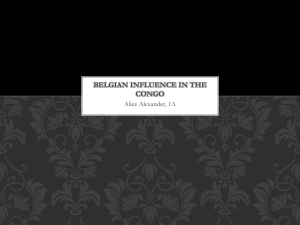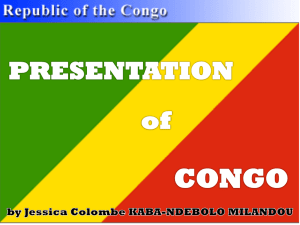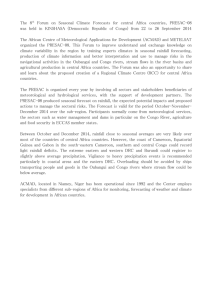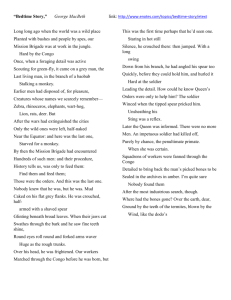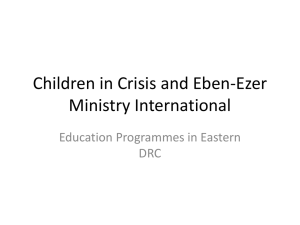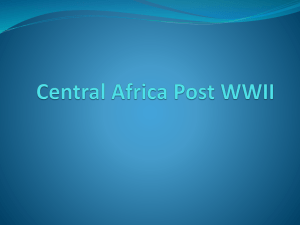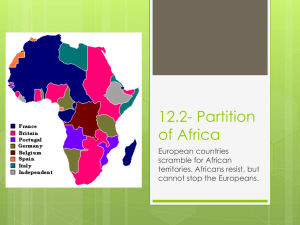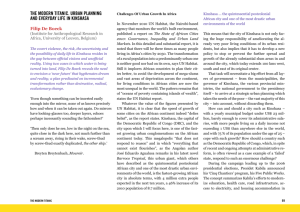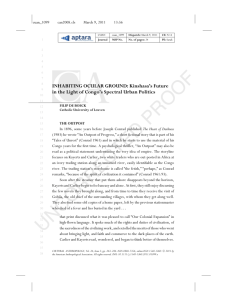incontro fra i popoli - joining people together
advertisement
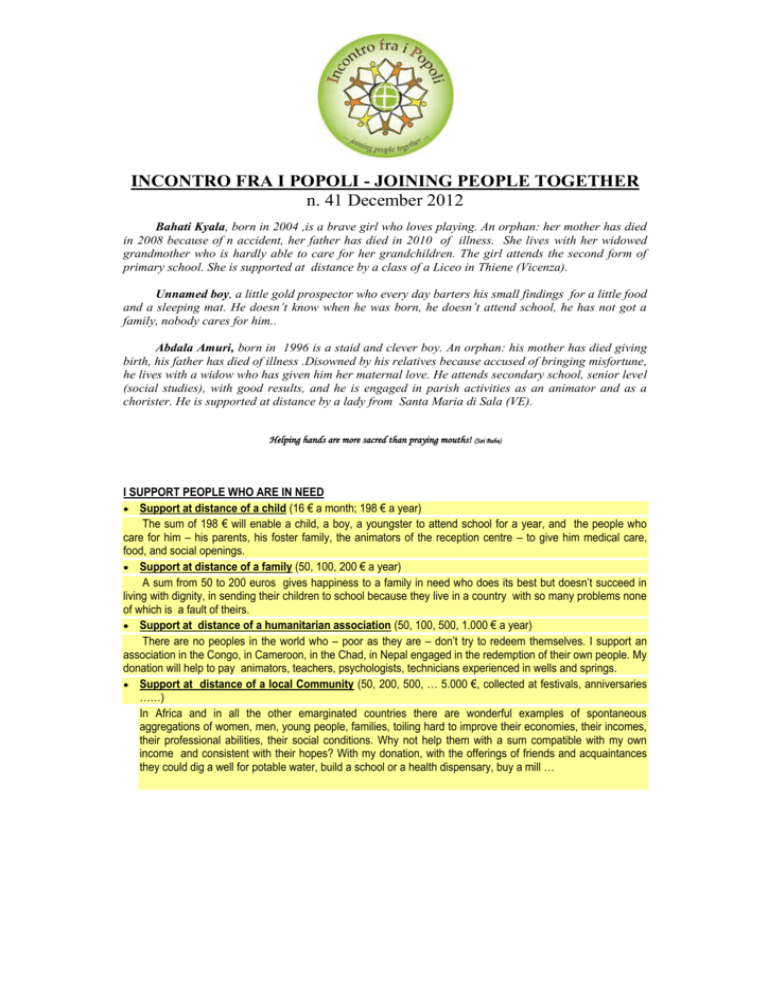
INCONTRO FRA I POPOLI - JOINING PEOPLE TOGETHER n. 41 December 2012 Bahati Kyala, born in 2004 ,is a brave girl who loves playing. An orphan: her mother has died in 2008 because of n accident, her father has died in 2010 of illness. She lives with her widowed grandmother who is hardly able to care for her grandchildren. The girl attends the second form of primary school. She is supported at distance by a class of a Liceo in Thiene (Vicenza). Unnamed boy, a little gold prospector who every day barters his small findings for a little food and a sleeping mat. He doesn’t know when he was born, he doesn’t attend school, he has not got a family, nobody cares for him.. Abdala Amuri, born in 1996 is a staid and clever boy. An orphan: his mother has died giving birth, his father has died of illness .Disowned by his relatives because accused of bringing misfortune, he lives with a widow who has given him her maternal love. He attends secondary school, senior level (social studies), with good results, and he is engaged in parish activities as an animator and as a chorister. He is supported at distance by a lady from Santa Maria di Sala (VE). Helping hands are more sacred than praying mouths! (Sai Baba) I SUPPORT PEOPLE WHO ARE IN NEED Support at distance of a child (16 € a month; 198 € a year) The sum of 198 € will enable a child, a boy, a youngster to attend school for a year, and the people who care for him – his parents, his foster family, the animators of the reception centre – to give him medical care, food, and social openings. Support at distance of a family (50, 100, 200 € a year) A sum from 50 to 200 euros gives happiness to a family in need who does its best but doesn’t succeed in living with dignity, in sending their children to school because they live in a country with so many problems none of which is a fault of theirs. Support at distance of a humanitarian association (50, 100, 500, 1.000 € a year) There are no peoples in the world who – poor as they are – don’t try to redeem themselves. I support an association in the Congo, in Cameroon, in the Chad, in Nepal engaged in the redemption of their own people. My donation will help to pay animators, teachers, psychologists, technicians experienced in wells and springs. Support at distance of a local Community (50, 200, 500, … 5.000 €, collected at festivals, anniversaries ……) In Africa and in all the other emarginated countries there are wonderful examples of spontaneous aggregations of women, men, young people, families, toiling hard to improve their economies, their incomes, their professional abilities, their social conditions. Why not help them with a sum compatible with my own income and consistent with their hopes? With my donation, with the offerings of friends and acquaintances they could dig a well for potable water, build a school or a health dispensary, buy a mill … THE WOMAN WITH THE GREAT SMILE THE Among all the children supported at a distance by “Incontro fra i Popoli”, about twenty are recommended and followed by “Organizzazione delle Donne e dei Ragazzi per lo Sviluppo”(OFED) in Uvira, a town in the Congo RD on the northern most shores of Lake Tanganyika. We have known and collaborated with OFED for ten years. This association was led by Mrs. Georgette Nayobanda, the lady with the great smile. In the saddest moments of the Congo when a bloody invasion war was raging there ten years ago, Georgette was deeply moved by the great number of children wandering around the plain in front of her house after their parents had been massacred. Thus, involving dozens of other women, she founded OFED. At the end of May 2012, Georgette left us for eternal life in consequence of a road accident. Having informed her that the European Union had provided large financial aid for her region newly tormented by war, she wrote, few days before leaving us, on May 19: “Why do you come and build hospitals and nurse our raped women? Help us instead to eliminate what disturbs our country, help us to reorganize ourselves, reinforce security, improve our social condition so that we wan’t need your assistance any more”. Good luck in eternal life, Georgette, in communion with us who are still on the earth. SIMPLE BUT HONEST Simple but honest,. kind-hearted but not unwary. That’s Pierre Shako, a carpenter in the town of Kinshasa in Congo RD, married to Francesca, father of four children, and of a girl found as a newborn on the threshold of his house.. When he was young he had studied to become a priest. Then he had changed his mind. A friend from seminary, who had become a priest and later the international representative of his congregation, asked him to follow some poor children for whom he had found with the help of “Incontro fra i Popoli” some supporters at distance in Italy . Talking to Pierre is a pleasure. His French would shock a Frenchman but not an Italian, and when he writes in French, he writes as he speaks, and therefore it’s easy for us Italians to understand him.. He lives on the extreme outskirts of the town, where there is nothing of a town, where there is no electric power, no water, no health dispensary.. The last time but one I was his guest in his poor house without mortar (too expensive) it was the last one with electric power. Beyond his house total darkness! So Pierre and Francesca bought a television set and about fifteen plastic chairs. “Thus the children of the neighbourhood can watch some comics, and the grown-ups can watch some films.” When I saw him last three months ago in the neighbourhood there was water, too, in addition to electrical power.: “We have organized ourselves and we have succeeded.”. Faithful and precise, every time I visit him he introduces me proudly to some twenty children, boys and youngsters supported by Incontro fra i Popoli. Pierre makes me check one by one for a photo to be sent to their supporters. I need not ask him how each of them is getting on. As we say in Italy, he knows “life, death and miracles” of each of them. Like a Saint Joseph, the carpenter, he is a father for all of them. HOW WE ADMINISTER the contribution for support at distance We send the money reaching us for support at distance to people and local associations we trust; they are our partners, the goers-between you and the beneficiary.. The donations are totally devolved to the named beneficiary. Ten percent of the sum pays for post and bank expenses, , secretariat, administrative papers, national and international connections, sensitization to the value of “solidarity”, to other poor people who reach out to our organization as the last hope of help.. If the donations at distance are higher then the amount required (i.g. for the digging of a well, the construction of a school, etc) the rest will be used to realize similar plans. We inform about the progress of support at distance plans by means of personal letters (at least twice a year) and by means of our quarterly newspaper. YOUR SUPPORT - Postal Account: IBAN IT 61 F 076 0112 1000 0001 2931 358 BIC BPPIITRRXXX - Bank Account: IBAN IT 92 C084 2962 5200 1701 0001 861 BIC PDCCIT2PXXX, Banca Padovana di Credito Cooperativo, succursale di Cittadella SOCIAL Enterprise of dressmakers / Ex-street children…is looking for support PEDER, a Congolese humanitarian organization operates in the town of Bukavu, refuge for the “evacuees” arriving from suburban villages because of the insecurity in their regions of origin. In their “ listening centres” the animators of PEDER approach “street children” and talk to them, addressing them to one of their four reception centres giving already hospitality to more than a thousand children who are followed in the learning of literacy skills, in schooling and in the acquisition of professional abilities (carpenters, tailors/dressmakers, mechanics). At the end of the course the boy – a young man by now – is encouraged to practise the job he has learned becoming a member of a group of young people who have finished the course before him and do the same job. He gets a set of tools he can use; however he gets to own them only after two years of work in his co-operative association.. The groups of co-operative associations are joined together in a confederation called ‘AEJT’ (Associazione dei Bambini e dei Giovani Lavoratori). Among those groups of young craftsmen there is one consisting of 9 ex-street children aged between 16 – 30, five males and 4 females, dressmakers all of them, a group called ‘Cimpwiji’(pronunciation:: Cimpuigi). Thanks to their apprenticeship and the necessary materials furnished by PEDER, the group has already succeeded in earning enough to help their families and in renting a work-shop. Mudusa, where these young people work, has not got a modern tailor’s and dressmaker’s. Women go to Bukavo, at a distance of 15 km, to have dresses made. Also the young people of Cimpwiji, have to go to this town to satisfy their customers (buying of materials, sewing of embroideries requested by their customers, etc) These young people think they can earn a better living, and serve their customers much better staying in Mudusa. However, to make this come true they need to improve their professional work which means they must equip their workshop with modern sewing machines and materials. Five normal sewing machines (425 €), one electrical overcasting machine(250 €), one button machine (160 €), one super-automatic machine (1.000 €), sleeve iron, normal and dented scissors, one electrical flat iron, and one coal-heated iron, a cutting table, chairs, squares and a big mirror (495 €): total 2.300 €. If the support were complete, additional 1.650 euros would be needed as starting capital for consumable goods (cloth, buttons, zippers……). Which person of good will feels like helping these young people to realize their dream? A veterinAriAn chemist’s in KinshAsA … will it be possibile? In Kinshasa, capital of the democratic republic of the Congo, stretching out for about 60 km with 7-10 million inhabitants, people are still starving, and many town-quarters are without water, roads, electrical power. This is reality also in the quarter of Lukanga. Like the other quarters on the outskirts it is nothing more than an agricultural centre where people live on agriculture and breeding of domestic animals, and where living is a hard and difficult job.. “AEJDD – Associazione di Promozione dei Giovani Dinamici impegnati nello Sviluppo” is an organization made up of 300 young families; it has got a statute, it is juridically recognized; its seat is the quarter of Lukanga in the municipality of Ngaliema (one of the 45 quarters the town is divided in). It is controlled by a board of management consisting of a chairman, Emmanuel Mayuma, a vicechairman, Pierre Shako, a secretary, Ezéchiel Bungu, and a bookkeeper, Annie Banza. In the past some of its members took part in the course of pisciculture organized by IfP. The AEJDD association devotes itself particularly to the professional training of women and young people employed in the breeding of domestic animals, in agriculture and in pisciculture. Knowing that their main source of proteins and of income is the breeding of domestic animals, the 300 young families forming the AEJDD, want to start a retail sale of veterinarian and foodstuff products as a means of self-financing. In fact, it is very sad to work hard breeding chicken, pigs, rabbits, etc, only to see them suddenly die of disease. To start this veterinarian chemist’s they ask for support: first month of rent of the salesroom (125 €), first stock of veterinarian products (590 €), first stock of animal foodstuffs (500 €), transport of these goods from the town-centre to their quarter (25 km, equal to a three hour trip 580 €): total amount 1.795 euros. Who can help these 300 families? Poor Democratic Republic of CONGO! A future as a suburb Leopoldo Rebellato Even the inhabitants of the Congo realize they live in such a vast, geographically, culturally and anthropologically varied country that it is impossible to conceive the existence of the “Congolese people”. Corruption and dictatorship, or better the total absence of the state, point out the difficulty of communication among the various parts of the country. There is no road net, no media web uniting the Congo. The political power is seen by everybody, by all the political parties, as a means of personal enrichment and as an opportunity of strengthening this power in the future.. The absence of any minimum political leadership in the administration of the country enables the better structured neighbour countries – and thus more attractive launching boards for the political and economic powers of the western countries - to erode the country from everywhere. Uganda is already the owner of the extreme north-east; Ruanda is taking away North Kivu and tries to do the same with South Kivu, a region already destabilized and wanted by Burundi. Thank goodness Tanzania and Zambia mind their own business. But a little further on Angola seems quite interested. And perhaps they try to explain this well plotted and timed plan as small tribal fights among different ethnic groups. But why only along the border to Uganda, Ruanda and Burundi? Or they speak about mutiny of parts of the Congolese army or of uncontrolled gangs of soldiers. What destabilizes North and South Kivu (about 200.000 km2, 6 million inhabitants) is a small army of 25.000 soldiers, first commanded by Nkunda, who, just charged with crimes against humanity, passed the command to Bosco , taking shelter in a a luxury hotel in Ruanda. Also Bosco, accused of the same crime, was replaced by…. How is it possible that the regular Congolese army is unable to defeat this old formation who speak Kinyarwanda and destabilize the country?..Of course it is impossible if immediately after driving away this mini pseudo-rebel army across the border to Ruanda, an order from Kinshasa asks to lay down the arms while the soldiers of the UNO are positioned between the rivals …. to save peace. And then the bubo breaks out similar to leopard spots in the mountains at the back and the flight starts again, the flight of dozens, if not of hundred thousands of defenceless people who wants only to be able to grow same manioc, to breed their goats and to send their children to school. And again ….hundreds of thousands of raped women, unheard of sufferings and invisible deaths. And when a territory is set free of this violence because the mini pseudo-rebel army, forerunner of other people’s interests, has gone elsewhere, the survivors find their land taken by other people; they are doomed to mortal nomadism in the forest or to living in the scanty suburban areas of a megalopolis. They speak about “balkanization” of the Congo which is true. The prospect is to divide the Congo in several states. This idea might be good if the plan were based on the prospect of giving identity, autonomy and independence to every group of peoples living in this mini continent (2 million 300 thousand km2), yet the division is planned according to the strong western powers who control the satellite states along the eastern border. The eastern territories of the Congo are too rich in precious minerals. No other country in the world can stand the comparison: gold, diamonds, aluminium, tin, zinc, cobalt. tantalum….… The autochthonous people are entirely ignorant of the secret plot the victims of which they are. A terrible collective psychosis – made real by the dripping of cruel daily events - is spreading among them “The neighbouring peoples want to come into our country, not because they want to live peacefully with us but to take our place killing us.” It is a real, long planned conquest. The peoples of Uganda, of Ruanda and of Burundi who are quite hemmed in in their own countries want the lands of the Kivu, the neighbouring Congolese region. And the western powers similar to grey eminences behind them – favour their attempts because Kivu is full of precious metal mine. They feed the political leaders, servile followers of the world energy and mining geopolitics. in these small border countries When the peoples destined to exclusion and extinction become aware of the fact and unite, w will only assist to an impotent explosion of fury with long knives against tanks, an explosion which will be put down so quickly to earn only a very short comment on some news programme followed by the eternal resignation of the remaining survivors to being the scanty suburbans of the local megalopolises. MY JOURNEY IN THE DEMOCRATIC REPUBLIC OF CONGO Michele Guidolin 25 years old As grey as Kinshasa, as black as Goma, as green as Bukavu, as blue as Lake Tanganyika, twentythree extremely intense days, from one extreme of the Republic of the Congo to the other, from the reception party crowded with ambassadors and leaders of the European Union to the human relationship meeting widows and humble farmers in the mud huts and at the valley end, from the discovery of the expressions of the local civil society to the meeting with groups of women and young entrepreneurs, in midst paradisian landscapes upset by wars and massacres. This is my extraordinary African experience on the threshold of my twenty-fifth year of life.. Of the abominable capital Kinshasa it is impossible not to remember the many shamefully degraded quarters, often without water, electric energy, roads, basic services, the tragedy of hunger – yet also the opportunity to render important services to the weakest members of society too, side by side with the Catholic University, or the political lesson at Kasangulu? In a country where the state is absent, corruption is the rule, democracy and human rights are crushed under foot every day, it was really strange to find a town mayor assembling in a few minutes around a table not only the representatives of “Incontro fra I Popoli” and of the university but also several rather different exponents of the local civic society, and giving way to an unbiased and constructive exchange. Transparency, sharing, joint responsibility, active citizenship and service: shouldn’t they make up politics distinguishing subjects from citizens? And then Goma … the depressing black of the awful lava stream of 2002 and the horror of the nearby massacres and of never ending war causing the instability which is the reason why the winners are the big western energy and mining interests and the egoisms of the small neighbouring nations to the cost of the helpless local people, and not withstanding the numerous UNO soldiers without the commission to protect the people. Working side by side with maitre Dunia, a lawyer of international fame, and the PDH, devoted to the promotion of democracy and protection of human rights was as exciting as deepening the knowledge of the Muungano association. And then Bukavu, with its marvellous landscapes of the Bushi and its two precious gems: the CAB and the PEDER. You could write pages about the reality of Congolese citizens devoted to the well-being of their people, particularly to the well-being of the weakest of them. The CAB can be compared to a sort of Ministry of Development; it operates in many different branches: water, agriculture, breeding, crafts, training and animation, structuring of base groups and co-operative groups. I still remember the twenty young people of a co-operative who find revenge on the disease of banana-trees and manioc, growing rice and animating the CAB. And sister Francesca whose Casertan accent can be heard whether she speaks Italian, or French, or Swahili, and who is the “mother” of the PEDER, since 2000 a partner structure of Incontro fra i Popoli and an extraordinary team giving continuous service to more than a thousand street-children. I wept my first tears when I was welcomed by one of their wonderful children in one of their four centres. A hearty thank you to Leopoldo who had asked me to come with him on this journey, and one night made me live one of the greatest experiences in my life: the meeting with the street-children, victims of war and poverty. Alert eyes, rare cleverness, joined in gangs to help one another, fortified with a little “smoke” (you can’t survive on the street without it!) What shall I tell about the numerous deaf and dumb children in the Betania Centre in Uvira and about their wonderful teachers who give them a training to be envied by the children of the same age in n0ormal schools ? And Mboko, on Lake Tanganyika, where, thought to be apt, I went alone with Congolese friends from Charité pour Tous (Carità per Tutti) to talk and reply authoritatively to the wise old chairman of one of the 11 local groups they follow, to hear the Mess in Swahili of which I understood nothing but that the last 45 minutes were a sort of news report about the life of the Christian community and about the political and social situation in the region and in the country. How awkward and discouraging to be in the forest wearing shorts! Finally, as the representative of the sector “Support at distance”, that wonderful form of global citizenship, it will be impossible to forget the faces of “my children”, of “our children” who are offered a definite opportunity of redemption from the unjustified conditions they are confined to, as well as the spirit and charity our Congolese partners are endowed with. Young university trainees at Incontro fra i Popoli tell… Nadia Paola Sampong University of Ca’ Foscari - Venice I take the bus and get off at Cittadella. I look for via Borgo Treviso. You must walk for two chilometres, they say. At last at 99 , Contrà Corte Tosoni. It is nine o’ clock sharp. «Hello, I’m looking for Mr. Leopoldo, I’ m here for an interview.” “He’s arriving. Take a seat.” I look around: two adjoining rooms. In the room where I am I can see the people I will later be introduced to: Ariella, the book-keeper, Michele, the representative of the sector “Support at distance”, and three more young men, Marc, a Frenchman, David, an Italian, and Xavier, a Spaniard. Nice surroundings, the room marked by merry colours, big lively pictures and printings, decorative statuettes. The young men stop working for a short exchange of witty remarks, then they go back to their PCs. There is a fine large glass wall through which the light of a sunny courtyard still covered with hoar-frost is streaming in, The atmosphere is friendly. A quarter of an hour later a gentleman of about sixty, with a beard and tidy looks, comes in. “Hi, I’ m Nadia. How do you do? “Leopoldo! Give me five minutes and I’ ll be back with you!” He says shaking hands. “And you, everything OK with your activities? Two more ladies, Ester and Maria, come in and sit down at their tables. I meet Leopoldo in his office which is colourful and also has a big glass-wall. He tells me about the organization mostly run by volontari helpers who are engaged in the training and animation in schools, in support at distance, in the periodical presentation of plans in front of the International Cooparation Committee at the EU and at the Foreign Office, in co-operation with local partners in Rumania, in R.D. Congo, Cameroon, Chad, Nepal and Sri Lanka. He informs me that the ONG is complex and is engaged in various activities, that hit publishes its own little newspaper: quite different occasional and recurrent activities are part of the social mission. I will have to contact each of these subject matters willingly because I will find some plans and enterprises started or already running, some being prepared, some on the starting point, some still being thought about. Leopoldo warns me: certainly there will not be an only or a single subject matter or plan to analize in every part but rather so many concrete facets of what later on I will come to understand as being part of the planet “Third sector”. As a true leader he tells me that on Monday there is a staff meeting. He adds that the coffee-break is a must, there are no established office-hours. We work and when we cannot work any more….. we come back the next day. He introduces me to the group in the other room …….And start working at once. Giada Malasorti University of Trento I made up my mind to do traineeship work according to my line of studies. A search on internet told me about “Incontro fra i Popoli” and I sent my application by mail. Some days later I got an answer from Michele giving me clear and detailed information about the stage work. Then Leopoldo called me on my cell-phone I came to Cittadella on March 14 for an interview with Leopoldo. I was quite excited because of the completely new context I was to meet. However, after an interesting chat, and meeting the rest of staff I felt at ease and willing to start the new experience, and to learn more about IfP and the way it works. We fixed the period and the days of my stage ( according to my study and job engagements), the work I would have to do as a stagist and other activities I would be involved in, among which a list of appointments and events apt for emersion in the association. In the middle of April I watched my first “Big World Banquet” directed by Michele.. I am very glad I had the opportunity of this traineeship. It was a way of knowing and understanding how an Italian ONG works, of acquiring direct experience of work, of improving some of my personal abilities such as using a pc and foreign languages. I was able to see how certain national and international dynamics work, I succeeded in understanding my own points of strength and what I still have to improve, This experience has taught me a lot from a human point of view too: I have understood the importance of the daily building up of the relationship with people in order to work better together. There is a really nice family atmosphere at the IfP. Manuela Colombero University of Torino “Incontro fra i Popoli” enters my life in the particular moment I would define as a ”moment of personal restructuring”, an important moment in which a person is particularly sensitive to external stimuli which therefore take on a special meaning.. I started this traineeship with the wish to serve the association in order to learn from the people I would meet rather than from the elements of knowledge I would collect for my graduation dissertation.. I come back home with a rich fund of useful knowledge because the people I have met are the bearers of great treasures, each of them different from all the others, from whom I have absorbed through osmosis. What I have learnt will help me to keep my engagement with society. A resolution not based as in the past only on youthful enthusiasm but from now on also on the example of the conquests made by IfP, on what they have done and are doing. I have ripened the wish of acting more concretely so as to be like the nightingale in the fairy tale who brings a drop of water in her small beak to join in the efforts of putting out the big fire raging in the forest. I will do my best, and if I will be able to leave a small trace of doing good behind, it will be a trace to which each of you from IFP has contributed.. SOLIDARITY GIFTS Bisweka: tales of a life spent around the word ; useful for kids, parents, grandparents, educators teachers and catechist (€ 10) Celapuoifare: a fairy tale to speak about people, family, society, ecology, politics; for families, educators, children and kids (€ 10) L'Umana Commedia: doubt tales, fear, hope, bravery; for those who believe that they can (€ 8) Solo noi bambini giochiamo con i nostri diritti: a children coloring album (€ 2) La favola del Cioccolato: a fairy tale on the chocolate story (€ 5) Lo struzzo prodigioso e il sogno di Kadù: a tale to explain the water needs of the unlucky children(€ 10) Borsa in stoffa: eco-friendly and useful bag for shopping (€ 2) “Anche la mucca nera fa il latte bianco”: ecologic cotton t-shirt (10 €) “L’indifferenza è la peggiore forma di violenza”: ecologic cotton t-shirt (10 €) New! Stati del mondo: all the countries of the world in a plastric sheet sized 30 x 21 cm. Any country have the surface, inhabitant, density e Human Development Index (HDI) datas. Useful for theachers, students, class; keep it next to you at the office or in your study place. (1 €) “In cammino … con le donne del mondo”: ecologic cotton t-shirt (10 €)
